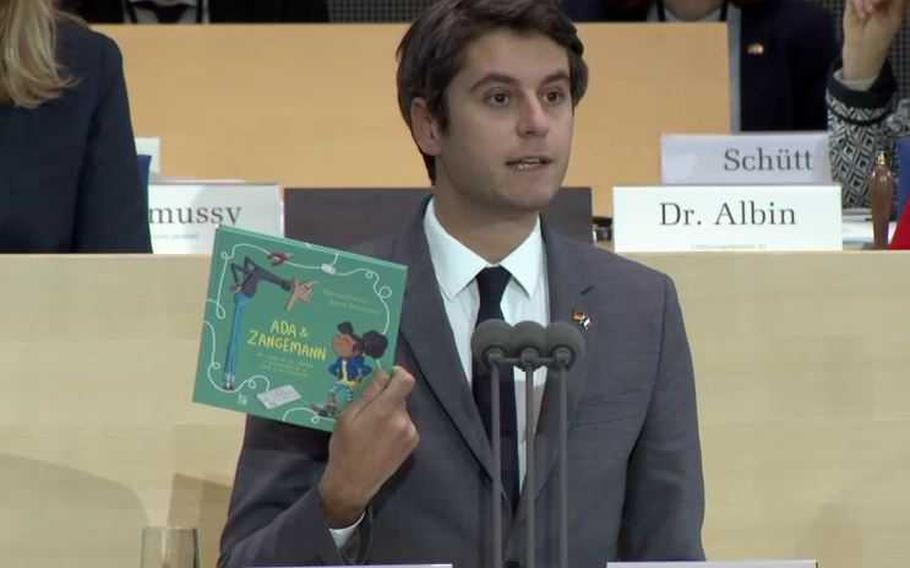
The French Minister of Education Gabriel Attal presents the book Ada & Zangemann which he offered on December 4, 2023 in Bonn to the parliamentarians of the Franco-German Parliamentary Assembly meeting in plenary session. (French National Assembly/Wikimedia Commons)
Thirty-four-year-old Gabriel Attal became France’s youngest prime minister and first openly gay head of government when he was appointed on Tuesday by President Emmanuel Macron.
The shake-up appears designed to reinvigorate Macron’s centrist government ahead of European Parliament elections in the spring, to shore up his legacy and, potentially, to cultivate a successor. Macron wrote on X, formerly Twitter, “I know I can count on your energy and your commitment to implement the rearmament and regeneration project that I have announced.” Attal said in a tweet that he was honored and would work “with strength, humility and without taboos in service of the French people.”
Attal’s appointment comes a day after his predecessor, Élisabeth Borne, resigned following a tumultuous 20 months in office, during which she went head-to-head with lawmakers and was forced to override Parliament on multiple occasions to ram through Macron’s legislative proposals on major topics such as labor reform and immigration.
Here’s what to know: Who is Gabriel Attal?
A longtime Macron loyalist, Attal was appointed education minister in the last government reshuffle in July. One of his first moves was divisive: a ban on abayas - the long, flowing dresses worn by some Muslim women - in public schools. Attal cited the core French principle of secularism in the public space. Politicians on the left and center-left accused him of violating individual rights while playing to right-wing voters. But he has managed to remain one of France’s most popular politicians, according to multiple opinion polls.
His appointment may not do much to shield against accusations that Macron’s government is elitist. Attal was born in a suburb of Paris and was educated in the French capital, where he earned degrees from Sciences Po and Paris-Panthéon-Assas University.
An early spokesperson for Marcon’s centrist political movement and for the government during the pandemic, Attal is considered “charismatic and pugnacious,” said Mujtaba Rahman, managing director for Europe at the Eurasia Group, in a written analysis.
Attal has even drawn comparisons to Macron, who became the youngest president in modern French history when he was elected at age 39. “Gabriel Attal, the new Macron?” ran a headline in the news weekly Le Point in September. On Tuesday, left-wing lawmaker Mathilde Panot posted on social media: “Adopting the maxim ‘you are never better served than by yourself,’ Macron decides to appoint a Macron Junior.”
Attal came out as gay in 2018, after joining Macron’s government.
Why did Macron name Gabriel Attal as prime minister?
Although Macron was once the wunderkind of French politics, his nearly seven years in office have left their mark. His approval ratings are low. He has just emerged from a year of social unrest animated by his unpopular reforms to France’s pension system, the fatal shooting of a teen by a police officer and a conservative immigration law. And the French far-right is leading in the polls ahead of the European Parliament elections in June. Macron is in need of “a fresh start and a new face,” Rahman assessed.
Macron may be hoping that some of Attal’s shine will rub off on him. “Gabriel Attal is Macron 2.0. By appointing him, the President expects to benefit from the popularity, the freshness, the energy, cleverness and disruption that embodies the bright, young, media-darling and quick-witted politician,” Sebastien Maillard, an associate fellow in Chatham House’s Europe program, said in an email.
Appointing Attal, who is considered to be on the center-left of the political spectrum, may also be an attempt by Macron to even out the political scales. “After the pension reform and the migration law adopted last year, Macron’s second term was perceived as leaning to the right. With Attal, the French President tries to go back to the very heart of what made his political success at the center of the spectrum,” Maillard said. What challenges does Gabriel Attal face?
Although Attal appears to have the wind in his sails, he will face headwinds in the months ahead as he seeks to help Macron cement his legacy and fend off the far-right.
He will have to appease lawmakers who are wary of Macron’s government after it bypassed their approval to enact major policy changes. Appointing Attal is “an admission that the radical reforming phase of the Macron era is over,” Rahman said. “Without a majority in the National Assembly - and with no hope of achieving one through early elections - Macron has been obliged to move to a gentler, more consensual phase of his presidency.”
Attal’s first major test will be to minimize the gains of the far-right in the European Parliament elections. He “will become the de facto face of Macronism in the European elections,” Rahman said. “The president hopes that he will be able to narrow the polling lead of the far right, led by Marine Le Pen’s deputy, Jordan Bardella, who is also plausible and telegenic - and even younger at 28.”
“The rivalry between Attal and Bardella will outstage” the one between Macron and far-right leader Marine Le Pen when Macron was running for his first term in office, Maillard said.
The stakes are high, Maillard added: “Should Attal succeed, he will inevitably become Macron’s political successor in the presidential race in 2027.”